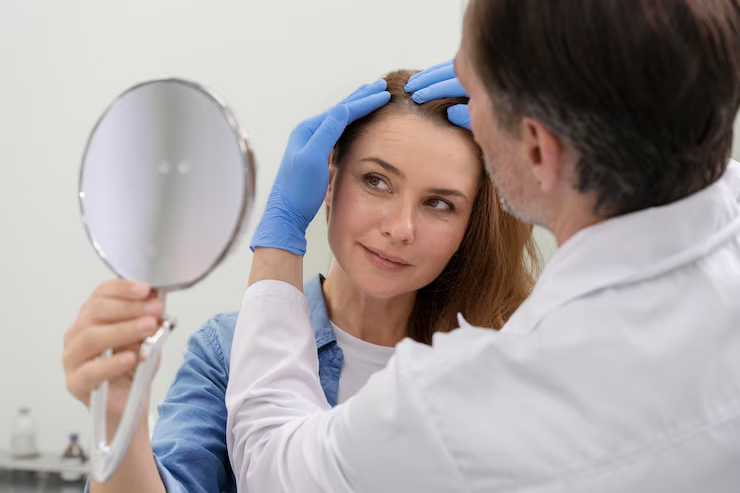Alopecia is a medical condition that causes hair loss, affecting people of all genders and ages. It can have a significant impact on self-esteem and quality of life. Fortunately, advancements in dermatology and hair restoration now offer a wide range of alopecia treatments that are more effective, less invasive, and tailored to individual needs. If you’re exploring options for professional alopecia treatment, especially if you’re considering procedures like hair transplants in Raleigh, NC, understanding your choices and what to expect can help you make an informed decision.
This article explores today’s best treatment options, the typical process involved, and an overview of Raleigh, NC hair transplant cost and services.
Understanding Alopecia
Alopecia refers broadly to hair loss, but it includes several distinct types:
- Androgenetic Alopecia: Also known as male or female pattern baldness, this is the most common type of hair loss.
- Alopecia Areata: An autoimmune disorder that results in patchy hair loss.
- Cicatricial (Scarring) Alopecia: Involves inflammation that damages hair follicles and causes permanent hair loss.
- Telogen Effluvium: Temporary hair shedding often triggered by stress, illness, or hormonal changes.
Each form of alopecia has different causes and requires a specific treatment approach.
Initial Consultation: Diagnosis and Customised Plan
Professional alopecia treatment begins with a detailed consultation with a dermatologist or hair restoration specialist. This includes:
- Scalp examination to determine the type and pattern of hair loss.
- Medical history review including family history, medications, and stress levels.
- Blood tests to rule out thyroid issues, iron deficiency, or autoimmune diseases.
- Trichoscopy or scalp biopsy in complex cases.
After diagnosis, the practitioner will recommend a treatment plan based on the severity of your condition, type of alopecia, and overall health.
Non-Surgical Alopecia Treatments
Many people begin their hair restoration journey with non-surgical treatments, especially when hair loss is still in early stages. These options are typically less invasive and can help maintain existing hair or promote regrowth.
Topical Medications
- Minoxidil (Rogaine): A topical solution that can slow down or reverse hair thinning. Available over-the-counter but best used under supervision for proper application and dosage.
Oral Medications
- Finasteride (Propecia): Commonly prescribed for men to reduce DHT (a hormone linked to hair loss). Women may be prescribed alternatives like spironolactone.
Platelet-Rich Plasma (PRP) Therapy
- PRP involves drawing a small amount of your blood, processing it to concentrate platelets, and injecting it into the scalp. The platelets contain growth factors that stimulate hair follicle activity and improve hair density.
Low-Level Laser Therapy (LLLT)
- A painless, non-invasive treatment using light energy to stimulate hair growth. Often used alongside other therapies to maximise results.
Corticosteroid Injections or Creams
- Often used for alopecia areata, corticosteroids help reduce inflammation and suppress immune response in affected areas.
Surgical Hair Restoration: Hair Transplantation
For individuals with permanent hair loss or advanced thinning, hair transplant surgery is one of the most reliable long-term solutions.
Types of Hair Transplants
FUE (Follicular Unit Extraction)
- Individual follicles are harvested from the donor area (usually the back of the scalp) and implanted into the thinning or bald areas.
- Minimally invasive and leaves no linear scar.
FUT (Follicular Unit Transplantation)
- A strip of skin is removed from the donor area, and individual grafts are extracted from this strip.
- Slightly more invasive but may yield more grafts in a single session.
Both methods offer natural-looking, permanent results, but the best technique depends on the individual’s hair type, pattern of hair loss, and treatment goals.
What to Expect During Hair Transplant Treatment
A hair transplant is typically done under local anaesthesia in an outpatient setting. The duration depends on the number of grafts being transplanted but can take 4–8 hours.
Post-Procedure Recovery:
- Mild swelling and discomfort for a few days.
- Tiny scabs form around grafts and fall off within a week.
- Hair shedding begins after 2–3 weeks (normal part of the growth cycle).
- Visible regrowth starts at 3–4 months, with full results in 9–12 months.
Patients are advised to follow specific aftercare instructions to avoid complications and maximise hair growth.
Raleigh, NC Hair Transplant Cost
In Raleigh, NC, the cost of hair transplant surgery can vary depending on:
- The number of grafts required
- The experience of the surgeon
- The method used (FUE vs. FUT)
- Whether additional treatments like PRP are included
Average Cost Estimates:
- FUE Hair Transplant: $4,000 to $10,000
- FUT Hair Transplant: $3,000 to $7,000
- PRP Add-On: $400 to $800 per session
Many clinics in Raleigh offer free consultations and flexible payment plans to make treatments more accessible. It’s important to confirm what is included in the quote—consultation fees, post-op care, and follow-ups.
Choosing a Hair Loss Specialist in Raleigh
Finding the right clinic or specialist is key to getting safe and effective results. Look for:
- Board-certified dermatologists or plastic surgeons
- Clinics specialising in alopecia and hair restoration
- Before-and-after galleries
- Verified reviews and testimonials
Raleigh is home to several reputable hair restoration centres that offer a combination of clinical expertise and advanced technology.
Emotional Support and Lifestyle Changes
Hair loss can impact mental health, and some individuals benefit from psychological support or counselling. Managing stress, improving sleep, and adjusting diet may also support hair regrowth when paired with professional treatments.
Conclusion
Modern alopecia treatments offer real hope for those struggling with hair loss. Whether you are exploring topical solutions, PRP therapy, or planning a hair transplant in Raleigh, NC, you have access to advanced options that are both safe and effective.
While Raleigh, NC hair transplant costs can vary, the investment is often worthwhile for those looking to restore hair density and confidence. By choosing a trusted specialist and following a personalised treatment plan, you can take proactive steps toward long-term hair restoration.

Leave A Comment